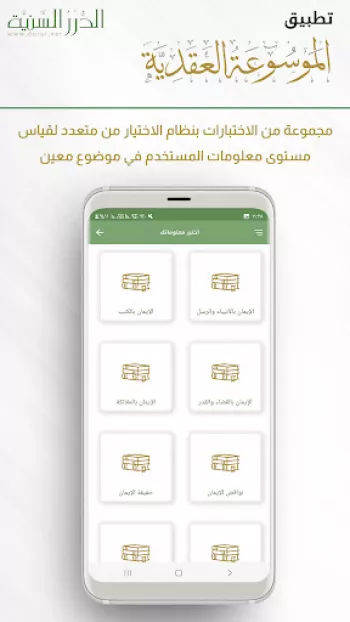Apps Home

Understanding the Foundation of Islamic Creed
The Islamic creed, or Aqeedah, forms the foundational principles upon which the faith of Muslims is anchored. It is more than just a belief system; it is an intricate framework that guides a believer's perception of existence, the divine, and the purpose of life. The essence of Aqeedah revolves around Tawhid, the belief in the oneness of Allah. This monotheistic principle is divided into three categories: Tawhid ar-Rububiyyah (Oneness of Lordship), Tawhid al-Asma wa as-Sifat (Oneness of Names and Attributes), and Tawhid al-Uluhiyyah (Oneness of Worship). Tawhid ar-Rububiyyah holds that Allah is the sole Creator, Sustainer, and Ruler of all that exists. This belief is not just theoretical but deeply embedded in the practical life of a Muslim. For instance, acknowledging Allah as the sole provider fosters a sense of reliance and gratitude, impacting one's daily actions and mindset. In Tawhid al-Asma wa as-Sifat, Muslims believe that Allah’s attributes are unique and unparalleled; He is all-knowing, all-powerful, and His attributes can never be compared to those of His creation. This understanding fosters a sense of awe and reverence, preventing any form of anthropomorphism, which is attributing human characteristics to the divine. Lastly, Tawhid al-Uluhiyyah emphasizes that worship is solely for Allah. Acts of worship, large or small, are performed with the intention of pleasing Allah exclusively. Practical manifestations of this include the five pillars of Islam: the declaration of faith (Shahada), prayer (Salah), fasting (Sawm), charity (Zakat), and pilgrimage (Hajj). Each of these acts reinforces the concept of worshipping Allah alone, aligning a believer’s actions with their innermost beliefs. Through the application of Tawhid, the Islamic creed shapes the personal, social, and spiritual facets of a Muslim's life, deeply influencing their interaction with the world.
The Role of Prophethood in Islamic Beliefs
Central to Islamic beliefs is the concept of prophethood, which is integral in understanding the communication between God and humanity. Prophets in Islam are considered selected individuals bestowed with the responsibility of conveying Allah’s message to mankind. This belief system views prophets not merely as religious teachers but as paragons who exemplify the highest ethical and moral standards. Muslims hold all prophets in high esteem, from Adam to Muhammad, with particular reverence for Muhammad as the final prophet. This culminates the belief that prophethood ended with Muhammad and that he brought the final and complete revelation in the form of the Quran. Practical implications of this belief include following the Sunnah, or practices of the Prophet Muhammad, which provide guidance on how to apply the teachings of the Quran in daily life. For instance, the Sunnah encompasses various aspects of life, from ethical behavior to rituals such as prayer and fasting, all of which are meticulously detailed in the Hadith literature. This transforms the theoretical aspects of prophethood into actionable guidance, ensuring the fidelity of Islamic teachings across generations. Moreover, the acknowledgment of universal prophethood instills a sense of universality and respect towards previous monotheistic faiths, as many prophets in Islam are shared with Christianity and Judaism, such as Moses and Jesus. This shared heritage fosters an understanding of commonalities among the Abrahamic faiths. Another vital aspect is the eschatological role of prophethood, where the teachings of prophets include forewarnings about the Day of Judgment, instilling a deeper sense of accountability and moral responsibility in the believers. Thus, belief in prophethood is not just about revering past leaders but about adhering to a divinely-ordained way of life that encompasses ethics, ritual practice, and an overall vision for living harmoniously in accordance with divine will.
Impact and Significance of Islamic Texts
Islamic texts, principally the Quran and Hadith, are pivotal in shaping the beliefs and practices within Islam. The Quran, regarded as the literal word of Allah, is central to the Islamic belief system; it is not just a religious text but a comprehensive guide for living a meaningful life. The Quran covers various topics such as spirituality, legislation, guidance, and morality, weaving them into a coherent doctrine that addresses both individual and societal aspects of life. The significance of the Quran is profound as it is considered preserved in its original form, offering Muslims direct access to the teachings intended by Allah. In contrast, the Hadith encompasses the sayings, actions, and approvals of Prophet Muhammad, providing context and detailed exposition of the Quranic texts. It is essential for understanding the circumstances surrounding revelations and offers practical examples of Quranic principles in action. This dynamic between Quran and Hadith champions a dual-source approach to faith, allowing for a more robust interpretation and application of doctrines. For instance, while the Quran might lay out the principle of fasting, the Hadith offers specific guidance on how to properly observe this act, including timing and the breaking of fast. This synergy ensures that Islamic teachings are both relevant and adaptable to different contexts and times. Furthermore, these texts serve as the foundation for Islamic jurisprudence or Sharia, which governs the daily lives of Muslims. The depth and breadth of these texts have fostered extensive scholarly traditions, where Islamic jurists analyze and interpret texts to deduce legal rulings. Consequently, the interplay of Quran and Hadith forms the backbone of Islamic learning and practice, offering a comprehensive framework that addresses both spiritual and worldly concerns. By engaging with these texts, Muslims deepen their understanding of the creed, reflecting the divine ethos in their conduct and belief.
Modern Interpretation and Challenges
In an increasingly interconnected world, the interpretation of Islamic beliefs and the application of its principles have undergone significant scrutiny and evolution. Although the core tenets remain unchanged, modern contexts necessitate a re-examination of how these beliefs are practiced and understood. One of the major challenges faced by Islamic scholars today is avoiding misinterpretations that could arise due to cultural differences or geopolitical dynamics. The rapid advancement in technology and communication has also brought Islamic teachings into a broader discourse, where interpretations are sometimes misaligned from the original texts, leading to confusion or misappropriation of beliefs. Another contemporary challenge is reconciling traditional beliefs with modern life complexities, such as gender equality, political systems, and human rights, which were less pronounced in classical interpretations. Many Islamic scholars are engaging with these contemporary issues, emphasizing that the essence of Islamic teaching is compatible with the principles of justice, equality, and human dignity. This involves an effort to highlight aspects of Islamic texts that champion social justice and equality, cutting through the historical and cultural practices that might have contradicted these ideals. Additionally, modern educational and technological tools have facilitated Islamic learning through platforms and applications, making Islamic teachings and scholarly work more accessible to a global audience. Such advancements allow for diversified sources of knowledge while promoting an informed understanding of the faith, exemplified by applications offering comprehensive encyclopedic content on Islamic creed and practice. These technologies provide tools like advanced search options and customization features, enabling believers to engage rigorously with complex theological concepts. Modern interpretation thus involves not just a faithful transmission of past teachings but a thoughtful engagement with contemporary issues, ensuring that the Islamic creed remains relevant and robust in providing spiritual and practical guidance in today’s society.
Resources for Deepening Understanding of Islamic Beliefs
Delving deeper into Islamic beliefs necessitates access to reliable resources that provide comprehensive insights and tools for learning. With the advent of digital technology, numerous platforms offer expansive knowledge bases that cater to varying levels of understanding, from beginners to advanced students of Islamic studies. One such resource is an application focused on the Islamic creed available on the Android platform. This application serves as a wide-ranging repository of information, encapsulating various aspects of Aqeedah and Tawhid following the methodology of the Ahl al-Sunnah wal-Jama’ah. It comes equipped with a modern design and cutting-edge technical capabilities, allowing users to explore, copy, and save material to favorites, as well as control font size and choose night reading modes for comfort. The application further facilitates advanced search options for any material presented, encouraging an exhaustive exploration of Islamic topics. Users can also test their knowledge on topics through interactive quizzes, which provides a means of assessing and reinforcing their understanding of the core principles. Such digital resources represent an evolution in how knowledge of the Islamic creed is disseminated, ensuring that learning is both user-friendly and adaptable to modern tech environments. To download this application specifically tailored for Android devices, one can easily access it through this convenient option: Download for Android. Through engaging with these resources, individuals can significantly deepen their understanding, fostering a more informed and practical application of Islamic beliefs in daily life. Such platforms not only address the traditional thirst for knowledge but also embrace the modern demand for accessible and interactive educational tools, ensuring that the rich tapestry of Islamic teachings continues to be woven into the fabric of contemporary lives.
Share Your Opinion
Your Email Will Not Be Published.
All Rights Reserved © Apps Home 2025
































Nacer Tahri
تطبيق ممتاز أنصح الجميع بتحميله وبارك الله في القائمين عليه.
Do it Now
تطبيق رائع جداً وسهل ومفيد للغاية
Mohamed Anwar (MhmdAnwr)
Excellent
Has R.AlN.
Very good
SAIF -MN
Very good